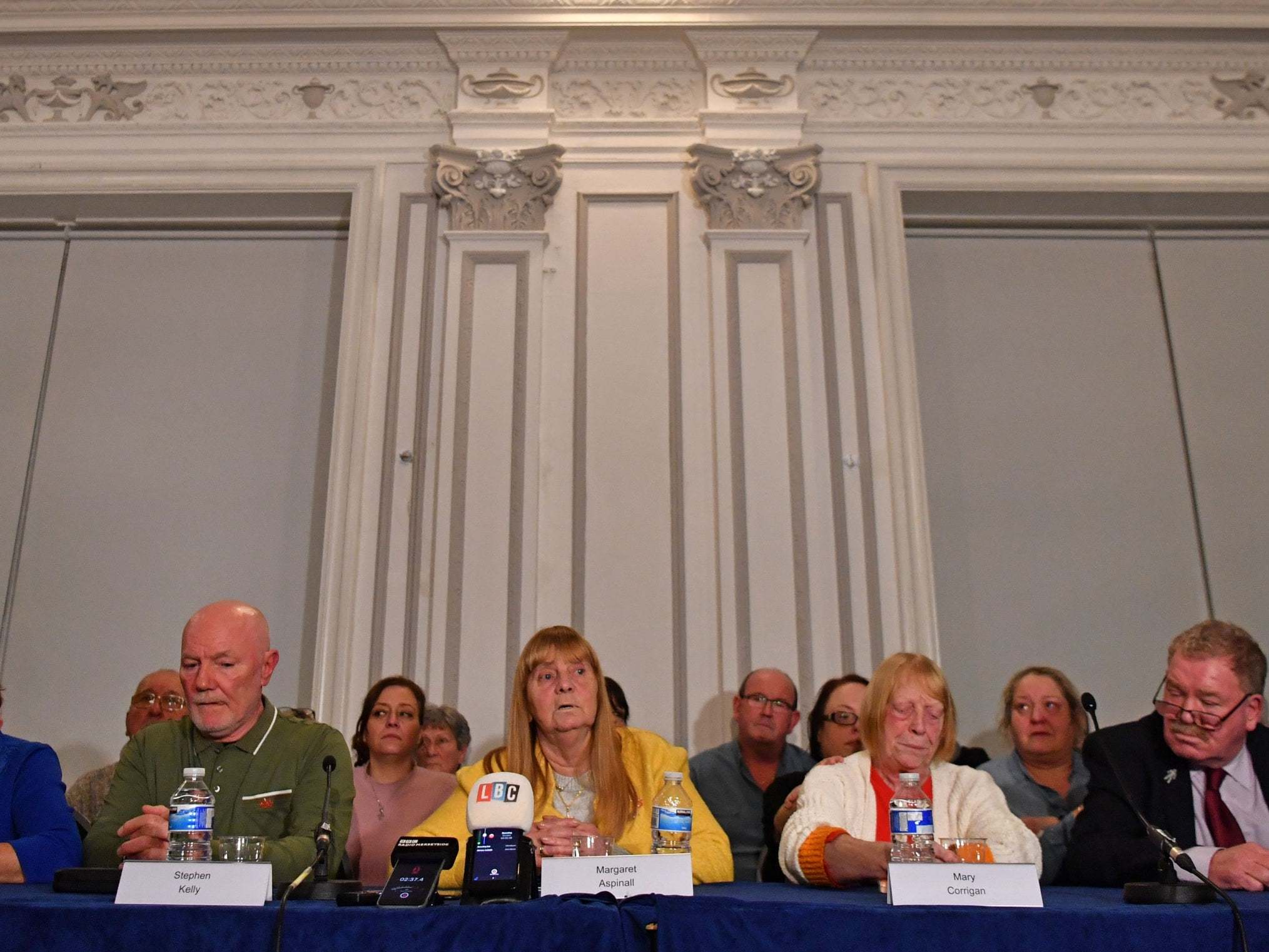The Hillsborough families’ search for justice goes on as David Duckenfield found not guilty of manslaughter
One survivor, listening to Duckenfield’s barrister give his closing address, said that it was ‘the worst day since 15 April 1989’, the date of the disaster

Your support helps us to tell the story
From reproductive rights to climate change to Big Tech, The Independent is on the ground when the story is developing. Whether it's investigating the financials of Elon Musk's pro-Trump PAC or producing our latest documentary, 'The A Word', which shines a light on the American women fighting for reproductive rights, we know how important it is to parse out the facts from the messaging.
At such a critical moment in US history, we need reporters on the ground. Your donation allows us to keep sending journalists to speak to both sides of the story.
The Independent is trusted by Americans across the entire political spectrum. And unlike many other quality news outlets, we choose not to lock Americans out of our reporting and analysis with paywalls. We believe quality journalism should be available to everyone, paid for by those who can afford it.
Your support makes all the difference.It seemed clear that David Duckenfield was going to be found not guilty of the gross negligence manslaughter of the 95 people who died on the day of the 1989 FA Cup semi-final at Hillsborough during the summing up of Sir Peter Openshaw, the judge at Preston Crown Court. Even though Duckenfield admitted at the second inquests three years ago that his decision caused the disaster and that he lied about it in the immediate aftermath of the fatal crush on the Leppings Lane and blamed the fans, the judge’s direction made the acquittal almost inevitable.
The judge said the inquests were “quite irrelevant” because “the rules and procedures were very different to a criminal trial”. Effectively, the jury were told that the longest inquest in British history was to be treated as meaningless when it came to deciding whether or not David Duckenfield’s conduct had been criminal. Benjamin Myers QC, Duckenfield’s barrister, repeatedly alleged that Liverpool fans arrived late at the stadium, that ticketless fans had an impact on the disaster, that alcohol was a factor and that supporters refused to follow the directions of the police.
All of these suggestions had been refuted by the inquest.
This verdict does not override or undo the inquest’s results. It is almost incomprehensible to imagine that no one will be held responsible for the deaths of 96 people – one of the victims died later so Duckenfield was charged over the 95 that were killed on the day. The actions of the chief superintendent who made the fatal decision to open the outside gates and allow 2,000 ticket-bearing fans to come into the ground in an unregulated surge were found not to be criminal.
In my opinion, the judge’s summing up was outrageously sympathetic to Duckenfield. Mr Justice Openshaw even suggested – despite the matchday commander admitting at the inquest that he told Graham Kelly, the FA’s chief executive, that fans had forced the gates – that Duckenfield may not have lied. The judge said that the defendant might have genuinely believed that the gates had been broken down. To me, the logic did not make the slightest bit of sense.
Throughout the case Duckenfield was treated with reverence. When the 75-year-old was taken to hospital with a chest infection, the judge referred to the defendant as “poor chap” to the jury. The families and their legal teams watched and listened in horror. One survivor, listening to Mr Myers’ closing address, said that it was “the worst day since 15 April 1989”, the date of the disaster.

So who is to blame? Who is accountable? Forget football and Liverpool, this has wider implications for those in civic employment and those who rely on the authorities to protect them. Whenever there is a public event, the British people should be able to expect those charged with maintaining safety and order to discharge their duties with a high degree of competence. If the procedures of the police and emergency services break down, the public have a right to know why and to find out who is responsible. No one has been held culpable for the Hillsborough disaster. I think it is a disturbing precedent and one that has cast a shadow over British justice for three decades.
Serious questions need to be asked of the Crown Prosecution Service (CPS). The prosecution barrister was a specialist in Health and Safety rather than a heavy-hitting criminal advocate. The reason for this is that the CPS instructed the barrister in 2013, before the inquests. The CPS did not imagine that the inquests would return an unlawful killing verdict and expected Duckenfield’s trial to centre on health and safety issues. That mistake played into the hands of the defence.
I feat this verdict will give licence to Hillsborough deniers, whose flat-earth views are frequently defined by football rivalries and a dislike of Scousers. Their views should not be given any credence. The exhaustive Hillsborough Independent Panel report in 2012 and subsequent inquests proved, without a shadow of doubt, that blame should not, and should never have been, directed at supporters.
There is another trial to come. In April, three men face allegations over the events that occurred in the aftermath of the disaster. That means that any comment about the Duckenfield verdict should be weighed carefully so as not to influence any potential jurors. After that legal action is finished a much fuller picture of what happened in 1989 and afterwards will emerge.
For now, the families and survivors feel they have been let down yet again. Many of them lost faith with the justice system a long time ago. As so often, they have been proved right by events.
Join our commenting forum
Join thought-provoking conversations, follow other Independent readers and see their replies
Comments